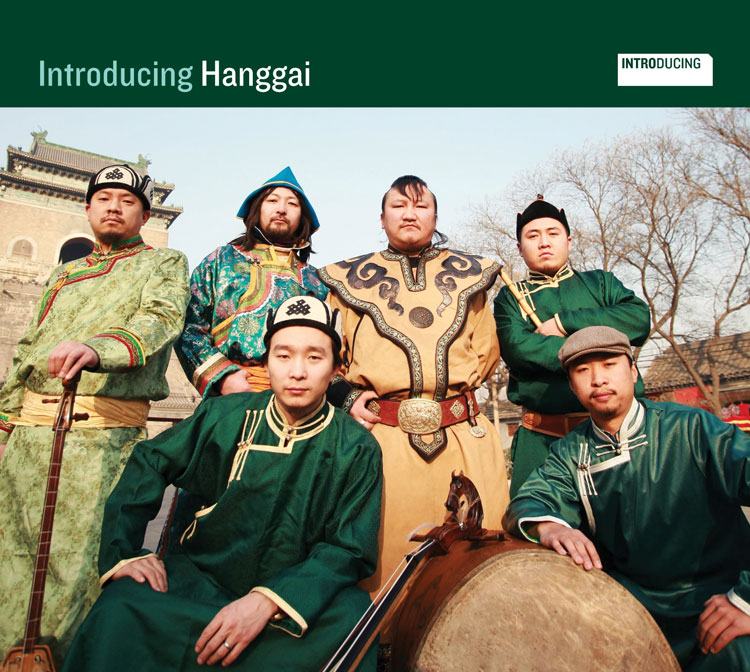Hanggai – Introducing Hanggai (World Music Network, 2008)
I’m always elated to hear a group of musicians rediscovering a lost or faded musical tradition, and I’m also a little puzzled because the music produced is usually so entrancing or just downright enthralling that I just can’t imagine why the tradition ever fell out of fashion. No example could be truer than that of Introducing/World Music Network’s release of Introducing Hanggai.
Dubbed “sounds from the Mongolian grasslands,” Introducing Hanggai is a hearty mix of tobshuur (two-stringed lute), sanxian (three-stringed plucked lute), morin khuur (horsehair violins), sihu (four-stringed bowed instrument) and the hoomei tradition of throat singing found in Mongolia. Moving through a series of songs that transport the listener by way of empty sky violins, the rasp of meaty overtone singing and Chinese bells, Introducing Hanggai sets the listener down in a faraway landscape of the traditional Mongolian folk song with built up layers of percussion and electronic elements to heighten the mix.
Comprised of musicians from Beijing and Inner Mongolia that include vocalist and tobshuur player Ilchi, vocalist and violinist Hugejiltu, vocalist and violist Bagen, saxian player Xu Jingchen and shiu player Hexigtuu, Hanggai is the latest hot group in the revival of Mongolian folk music.
Opening the CD is the bright and lively “My Banjo and I,” contained in an eddying mix of sweeping violins and flashes of galloping rhythms against the richness of the vocals. Tracks like “Yekul Song,” “Zhaoderen Nana” and “Haar Hu” are ruled over by the sweep and measured rhythms of the horsehair violins and the rollicking charm of the vocals. The opening lines of throat singing laid down in “Five Heroes” will raise the hair on the back of your neck, but the addition of a twangy guitar against an eerie landscape of lute, violin and back echoes makes this piece one of the standouts on the CD.
The unusual southwestern feel to this track makes it a perfect theme if Sergio Leone composed for a spaghetti western set in Mongolia; and the fact that song is about a group of vigilantes robbing the rich and giving to the poor makes it all the more right. Tracks like “Flowers” and “Wuji” are propped up by a rock structure propelled by the steadying rhythms laid down by violin and vocals.
The haunting harmonies created on “Lullaby” (Borulai) are laced with tinkling rain, delicate bells and elegant violin lines that end in flourishes as thin as a line of smoke. “Drinking Song” is proof that drunken parties all around the world sound pretty much the same and have a really great song-a-long that all the revelers know. One of my favorites has to be “Four Seasons” with its meaty throat singing against the soaring vocals of guest singer Hurcha.
Introducing Hanggai is charming, raucous, brilliantly jubilant and a breath of fresh Mongolian grassland. Kudos go to producers Robin Haller and Matteo Scumaci for their additions of electric guitar, banjo, bass, percussion and programming, but also their vision in expanding the sound of the traditional while keeping the sound true.
Buy the CD:
- In North America: Introducing Hanggai
- In Europe: Introducing Hanggai


